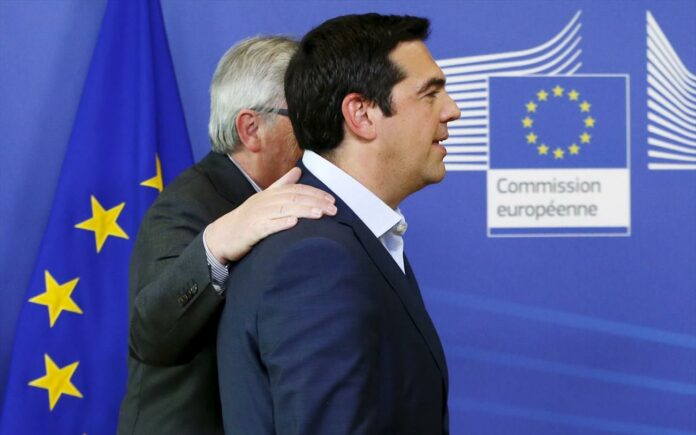By Vassilis Kostoulas
[email protected]
The Tsipras government’s unilateral decision this week to increase the minimum monthly wage scale by 11 percent – something repeatedly promised over the recent period – reportedly generated a certain degree of unease on the part of certain European creditors and partners, with the “surprise element” mostly touching on the level of the increase.
The decision, announced during a nationally televised Cabinet meeting (by the state-run broadcaster) by a beaming Alexis Tsipras himself, and accompanied by the applause of his ministers, nevertheless comes in the face of creditors’ insistence that reforms and liberalizations to boost the country’s competitiveness, achieved through three successive memorandum programs, should be religiously maintained in the post-bailout period.
In private conversations, creditors’ representatives continued to stress that they were more interested in keeping labor costs down, relevant to production and competitiveness indexes, instead of insisting that a pre-legislated cut in roughly one-third of pension rates in the country actually be implemented. The social security reduction was eventually avoided, with creditors’ acquiesce.
In the wake of the minimum monthly wage announcement, however, no official “reaction” was discernible.
What is more than evident back in Athens is the fact that the Tsipras government, now devoid of its “coalition” moniker but relying on a handful of newly independent MPs – including Cabinet ministers – is now concentrating entirely on upcoming elections. Local government and European Parliament elections are scheduled for May, while general elections can come no later than October, although results of the former may bump up the date of the latter.
The lack of “blow back” on the part of European creditors to the wage scale hike appears to have demonstrated that the “enhanced supervision” regime foisted on Greece by creditors after the third bailout ended in August 2018 is, in practice, a “looser supervision”. As such, recent decisions announcing increased social spending, public sector hirings and, finally, the private sector wage hike – imposed unilaterally and bypassing collective bargaining negotiations – are seen as offering much-needed “momentum” to Tsipras and his poll-trailing SYRIZA party ahead of the ballot box.
At the same time, geopolitical interest in Greece dramatically shifted over the recent period to focus on the ratified Prespa agreement, a genuine foreign policy victory for Tsipras and his leftist party, amid shrill reactions by the country’s political opposition and much of Greek society, in fact.
Negotiating, signing and finally ratifying the agreement, aimed to resolve the nearly three-decade-long dispute with the former Yugoslav Republic of Macedonia (fYRoM) over its constitutional name, has affected geopolitical balances in the region and added yet another variable to the economic “calculus” in post-bailout Greece.
Essentially, European partners and creditors have stopped, to a large extent, voicing their true thoughts and concerns over the Greek economy’s prospects. As a result, promoting the narrative of a – belated – Greek “success story” is now apparently judged as more important than eliminating medium-term risks for the thrice bailed out country.
Finally, it’s also important to note that despite the completion of the program last August, public sector borrowing costs remain at particularly high levels, compared to the rest of the Eurozone, whereas the economic climate index continues to deteriorate and the country’s systemic banks are still looking for solutions to deal with the financial “time bomb” entailed in non-performing loans.














